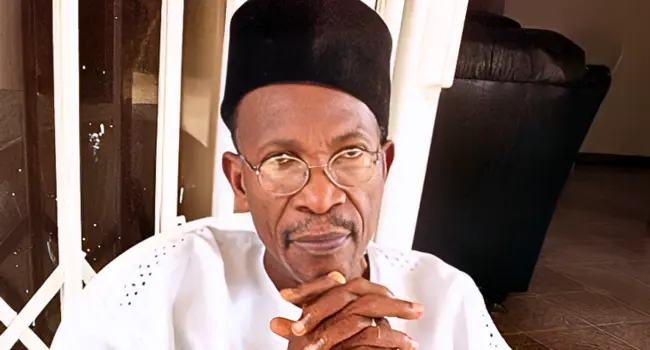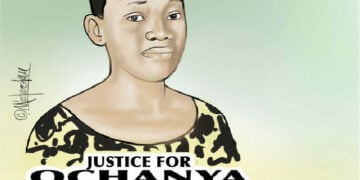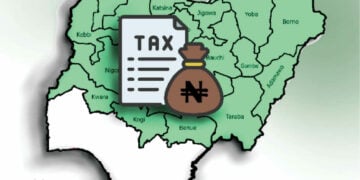The unexamined life is not worth living”, argued Socrates as he bravely faced trial for ungodliness and corrupting youth. He chose death rather than exile, opting to continue seeking the truth to his question in the after-life rather than live a life not identifying the answer on earth. He believed that philosophy – the love of wisdom – was the most important pursuit in life. As a philosopher, he exemplified the pursuit of wisdom through questioning and logical argument, by examining and by thinking. He encouraged all those around him to carry out their own “examination” of life, because an ‘unexamined life’ was not worth living.
I don’t know if Frank Ovie Kokori read a lot of Socrates. Not all of us are gifted with the perspicacity of Prof Akin Onigbinde whose admiration for the intellectual peregrinations of Socrates are well documented. But, whether he realised it or not, Kokori lived a life that Socrates would have described as ‘examined’— a life dedicated to using one’s highly developed faculty of thought to raise one’s existence above that of ordinary beasts.
Crossroads
Every epochal human situation throws up its own heroes and villains. Human beings have the free will to identify with one or the other. When Nigeria arrived at its own crossroads in the form of an annulled election by a military dictatorship, the ‘saints’ sided with the National Democratic Coalition (NADECO) while the ‘demons’, led by Arthur Nzeribe and Abimbola Davies, cobbled together a contraption they called Association for a Better Nigeria, ABN.
The Ibrahim Babangida junta had created two political parties— the National Republican Convention (NRC) and the Social Democratic Party (SDP). In the presidential election of 1993, the SDP candidate, MKO Abiola, was coasting his way to victory when ABN swung into action through a court injunction which stopped further declaration of the results. The declared intention of the organisation was to encourage the military to stay in power because, according to Nzeribe and his fellow opportunists, politicians were too corrupt to be trusted with power.
Overall, however, it seemed that Providence conspired with the long-suffering people of Nigeria to deliver a credible, violence-free presidential election. In most parts of the country, there were no polling booths but the elements remained favourable as the rains did not fall as feared. Nobody thought much of the threat posed by ABN and its proponents until it secured the late night court ruling from Justice Bassey Ikpeme which tried to stop the elections. That was followed by Justice Dahiru Salleh’s judgement in another case where the judge ruled that the elections ought not to have been held at all and were therefore null and void.
Heroism
For the nation at large, the annulment of what was adjudged as the freest and fairest election in the history of the country was an inglorious slide from the euphoria of great expectations to the pit of disappointment and despair. The country was being torn apart at the seams but it managed to remain as one entity, albeit with loud cries of ‘To your tents, o Clansman!’
Frank Ovie Kokori has gone down in history as one of the heroes of that unfortunate era when an election which brought out the best in us because it crushed all the centrifugal indices that had always kept the common people from one part of the country from identifying with those from other parts— to become, unfortunately, our worst moment as tribe and tongue and mode of worship took over.
Real men stood up to be counted. As a company executive in Lagos, and given our activist commitments at the university, it was impossible to be neutral. Many became NADECO sponsors, couriers, safehouse-keepers, communication relay-men , etc. In my judgement, next to the civil war of 1966-1970, I think it was the closest that Nigeria came to disintegration. What still cast a pan-Nigerian halo over the organisation was the fact that it had subscribers from all parts of the country.
With committed patriots like Chief Anthony Enahoro, Chief Ayo Adebanjo, Air Commodore Dan Suleiman, Rear Admiral Ndubuisi Kanu, Chief Olu Falae, Chief Ayo Opadokun, Wale Osun, Frank Kokori, Cornelius Adebayo and Bola Tinubu, among others in the vanguard, NADECO was a potent pro-democracy force loathed by the Abacha junta which succeeded Babangida. From his vantage position as General Secretary of the National Union of Petroleum and Natural Gas Workers (NUPENG) Kokori emerged as a pivotal figure in the struggle for the validation of the annulled June 12, 1993, presidential election.
Close Shave
Those were dangerous times. I interacted with Kokori only twice throughout the hide-and-seek days. The government was pretty effective in hunting down NADECO sympathisers, so one had to be extremely careful. I remember when one notable journalist who was on the wanted list of the authorities stopped by my office to pick up some supplies. He wore a pair of jeans and a t-shirt and held his seven-year-old daughter wearing a school uniform.The secret service chose the same afternoon to randomly come into the office to ask if I had seen Mr. XYZ.
Of course, I hadn’t! Why would anyone try to link me with a trouble maker when it was clear to anyone with half a brain that I was but a quiet, patriotic professional going about my own business? They left without as much as a second glance at the man in jeans holding a school girl. It was the closest shave.
Kokori was in the very eye of the storm. Apart from being a labour leader, he had also been the Treasurer of the Social Democratic Party. In 1994, he orchestrated a nine-week industrial action demanding the release of Abiola from detention and inauguration of his government, which crippled commerce all over the country as there was no fuel to power vehicles for commerce, commuting and ferrying of goods. After a period of hide and seek, the military government arrested Kokori and clamped him in solitary confinement in Bama prison.
Examined Life
He spent four years in jail before the Abdulsalami regime released him and other prisoners. He was declared a prisoner of conscience by both Pope John Paul II and South Africa’s President Nelson Mandela.
Two years ago, at the National Institute for Labour Studies, Kokori bared his soul to serving and future labour leaders:
“People like us sit and weep when we see black people crossing the Mediterranean Sea and Sahara desert looking for green pastures in Europe. And then we now remember people like Kwame Nkrumah, Nyerere of Tanzania, Kenneth Kaunda, Azikiwe, Awolowo. If these people were still here, we wouldn’t have this type of humiliation of the black people of the continent. In Nigeria, we were at a higher pedestal than countries like India, Malaysia and the rest”.
“You can see that there’s so much injustice and corruption in the country. You have the biggest billionaires in the world in Nigeria and the poorest people who can’t even earn one dollar a day in this country. So, this is the root of the whole thing. When people today cry about fuel subsidy; it’s not that the Nigerian fuel is really high. The issue is that the people have been pauperised. The problem is that you have the super rich people and the real poverty-stricken people of this world in Nigeria”.
It was that commitment to the welfare of those on the lower rungs of life’s ladder that stands Kokori out as a man who identified his mission on earth and lived it to the full, even at the risk of his life. He lived what Socrates would have described as an examined life. His death on the very day he turned 80 indicates that the elements were aligned at the last curtain call of this great man as he transited from mortality to immortality.
God rest his valiant soul.





